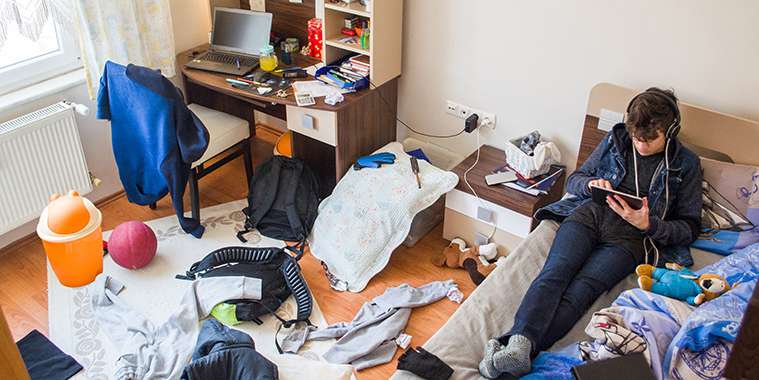Do you worry that your untidy home has crossed the line from organized chaos to an anguished cry for help? You’re not alone. After a series of busy weeks that left you zero time to clean, you might start to question whether your Sharknado wreck of a home would make the cut for TLC’s reality show “Hoarders.”
According to Fugen Neziroglu, a clinical psychologist at the Bio-Behavioral Institute, hoarding is a heavier issue than just having a messy home. It can cause — or spring from — serious emotional, physical, social, and financial issues.
So, most routinely untidy folks don’t meet the requirements for a clinical diagnosis, even if you do have a pantry bursting with potato chips and towering stacks of CDs from that Dave Matthews Band phase.
Need a reality check? If you can relate to the situations below, you’re not a hoarder — you’re just not fazed by a little clutter. And maybe you’ll glean some tips on how to deal with it.
You can clean up fast when an unexpected guest arrives
Can you easily pick up your messy piles and throw them into a closet, giving your place the appearance of tidiness? Organization guru and author of “Keep This Toss That” Jamie Novak calls this going into “scoop-and-dump mode.”
If making your place look halfway presentable requires only this much effort, you’re probably more messy than deranged.
You’re happy to get rid of things you don’t need
A big difference between someone who hoards and someone who is messy is their desire to actually clean up, notes Novak.
“A cluttered house can be transformed into an organized one if the homeowner is willing to part with many of his or her things,” she says. But if the person has hoarding tendencies, cleaning up isn’t possible.
“The messiness is becoming a problem when you accumulate unnecessary items and then are simply unable to discard them,” Neziroglu adds.
You can walk into every room of your house
In a hoarder’s home, clutter tends to obstruct doors and stairs, says Heather Walker, founder of Functional Spaces Organizing.
“In extreme instances, everyday spaces can’t be utilized for their intended purpose, such as a table for eating or a bed for sleeping,” adds Novak. And for some hoarders, there’s long-term structural damage to the home because of the amount of stuff inside (the HVAC may be permanently blocked, for example).
If you spent a couple of hours cleaning your house, it would be obvious
Despite her profession as an organizer, Walker admits that her house can get quite messy. But she can clean up quickly — the key is, every item she owns has a home.
“The catch is not to let your piles turn into chaos,” she says.
A borderline hoarder has bigger issues: “A messy person may be disorganized, but she doesn’t usually accumulate items that others would view as having no value,” notes Neziroglu. If there’s no “home” for your towers of masking tape or bins of buttons, you’re tipping toward hoarding.
You know your mother’s wedding ring holds more value than a food wrapper
“Our possessions are sentimental to us because they give a sense of identity and personal history,” notes Walker. A messy person knows full well old magazines have to be recycled. “But for people with hoarding problems, the items’ importance is greatly exaggerated.”
Many times, for a hoarder, trash is mixed in with important possessions and the homeowner is unable to discern the difference.
You’re an avid collector — and your items look great in their display cases
“A typical collection is nicely displayed, frequently referenced, and brings joy to the owner,” explains Walker. Proper collections usually warrant a specific spot, are well-maintained, and have some significant value (monetary or sentimental).
Hoarders, however, don’t own collections in the true sense of the word. They purchase or pick up things with the intention of finding some use for them, but never do. If you have a nice set of china or figurines, make a point of setting them up in style. If not, it’s time to donate the whole lot!
Putting stuff in storage doesn’t make you sweat
If you’re willing to pare down and document the important items in order to keep some of them, you’re far from a hoarder. Once you have clutter under control, photograph or write down a description of the special possessions, say both Walker and Novak.
“I usually ask my clients to think about how they would feel if they lost the item in a fire,” says Walker. If you know you’d cry, don’t get rid of it. “Just find an appropriate and safe storage space and keep the item with great intention.”
The American Psychiatric Association recognizes hoarding as a mental disorder often stemming from other psychological problems. While medications have not been found to be effective, hoarding is treatable with cognitive behavioral therapy, says Neziroglu. If you’d like to find a therapist or simply take a self-assessment questionnaire, go to iocdf.org or biobehavioralinstitute.com.
— realtor.com



